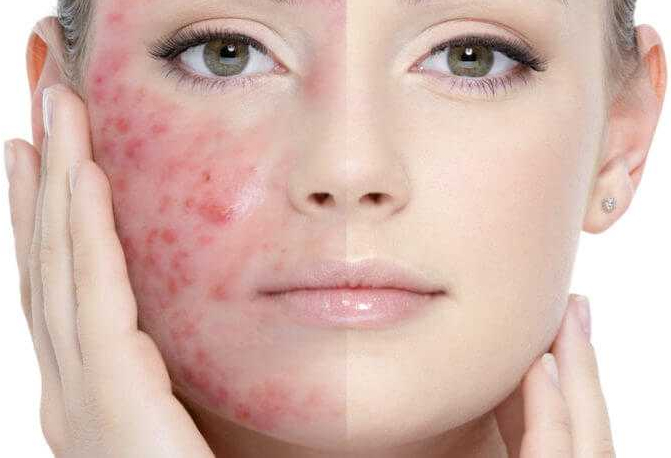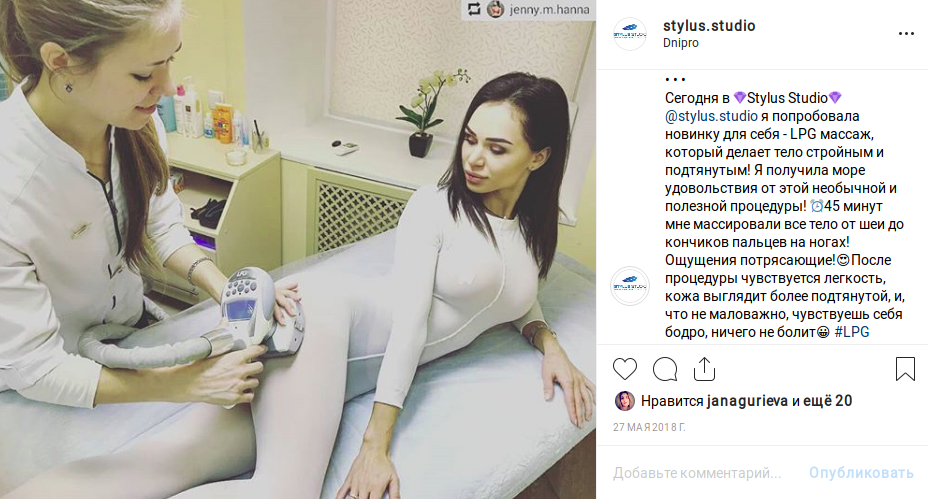Acne is a common inflammatory skin disease caused by a decrease in its bactericidal function and activation of pathogenic microflora. Under the influence of unfavorable factors, the sebaceous glands, whose main task is to soften and moisturize the skin, begin to produce an increased amount of secretion. As a result, the sebaceous sac is stretched, the secret is thickened, and keratinized cells of the epidermis and various polluting particles are mixed into it. This is how comedones (or acne) appear on the skin. The skin takes on a painful, unkempt appearance, and infection easily penetrates into the enlarged pores.
Another cause of acne can be skin exposure to comedogenic substances that cause blockage of the sebaceous glands and hyperkeratosis (rough skin). These are various oils, lubricants, and tar-containing products. Excessive use of cosmetics containing fats, taking anabolic steroids can also provoke acne.
Causes of acne
Acne occurs as a result of exposure to endogenous (internal) and exogenous (external) factors.
Endogenous factors:
1. Testosterone – is the most common cause of teenage acne. With the active release of sex hormones (especially in boys), the secretion of the sebaceous glands increases, which leads to the appearance of acne.
2. Changes in hormonal levels before menstruation. About a week before the onset of menstruation, hormonal changes occur, this can cause rashes.
3. Endocrine disorders. Sometimes acne can be caused by adrenal dysfunction. Therefore, if acne occurs in adults, then in addition to a dermatologist and a cosmetologist, they must also consult an endocrinologist. In women, acne can appear against the background of polycystic ovary disease, so you should also consult a gynecologist.
4. Diseases of the gastrointestinal tract. Some studies have shown that the appearance of acne can be directly related to the nature of the diet and the condition of the gastrointestinal tract. When the diet is dominated by food containing a large amount of carbohydrates and at the same time there are no essential amino acids, it leads to increased function of the sebaceous glands. In such cases, normalization of nutrition allows you to establish the secretion of sebum and, as a result, get rid of acne and blackheads. As practice shows, more than half of patients develop acne against the background of gastritis and intestinal dysbiosis.
5. Frequent stress. Nervous strain often contributes to a decrease in immunity, which leads to a violation of the microflora on the skin and the appearance of rashes.
Exogenous factors:
1. Using improperly selected cosmetics. Acne can develop due to the use of so-called comedogenic cosmetics, which clog the pores. You should pay attention to the composition of cosmetics. Many of them contain that contribute to the appearance of acne. These include: oils (corn, coconut, mineral, almond, peach, soy), oleic acid, lanolin, petrolatum, sulfur, sorbitan oleate, lauryl sulfate. volume_upcontent_copysharestar_border
2. Hot weather and high humidity are unfavorable conditions for the skin, especially prone to oily. In hot weather and high humidity, acne can worsen. This is due to the release of sweat. That is why, in a hot period, rashes most often appear on the neck, back and chest. These are the parts of the body that are most irritated by sweat secretions. volume_upcontent_copysharestar_border
3. Ultraviolet light. In small quantities, the effect of ultraviolet radiation has a disinfecting effect on the skin, but at the same time, its excess causes a completely opposite effect.
4. Toxic substances. Constant contact with various harmful chemicals: household chemicals, oil products, lubricants, chlorine and other irritants contribute to the appearance of acne and acne on the skin.
5. Squeezing out acne. Very often, hands and reach out to squeeze out the hated pimple on the face. But it is categorically not recommended to do this, since in this case the infection penetrates deep into the skin, thereby contributing to the aggravation of the process.
Prevention of acne
Most often, acne occurs in people with oily skin, so its owners need to take special care of it. First of all, it is necessary to maintain hygiene and daily care aimed at eliminating excess fat. An excellent option would be care in 4 stages: cleansing with foam or gel for washing, wiping with lotion, applying a moisturizer, periodic peels and masks on the problem. Peels are aimed at removing dead skin cells that can clog sebaceous ducts and cause inflammation. This stage is a cosmetic procedure that should only be carried out by a specialist in the salon. It will not be superfluous to consult a cosmetologist for the selection of the correct home care for oily skin.
Beware of alcohol! Cosmetics should not contain large amounts of alcohol, as is the case in cheap store cosmetics. Alcohol destroys the skin’s hydrolipidic barrier (its protective membrane), as a result of which the skin loses moisture, begins to peel off, and the sebaceous glands produce sebum even more. Therefore, for the care of oily skin, you should choose only professional cosmetics.
Another element of prevention is proper nutrition and regular examinations of the body, since any failure in the hormonal system or the gastrointestinal tract can lead to acne.
Acne treatment
There are a huge number of drugs and beauty treatments that work great with acne. However, a lasting result can be achieved only with complex treatment. It is not enough to apply only local treatment, it is necessary to find out the cause of the rash and eliminate it. Self-medication can be ineffective and even aggravate the process. That is why with this disease you need to contact a specialist who will find the cause and prescribe the correct treatment.




